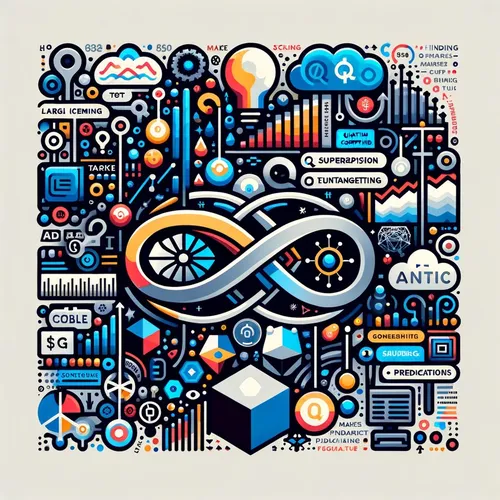Quantum Leaps: OQC's Bold 200 Qubit Plan, Error Correction Breakthroughs, and IonQ's Strategic Acquisition
- Author
- Inception Point Ai
- Published
- Sun 08 Jun 2025
- Episode Link
- https://www.spreaker.com/episode/quantum-leaps-oqc-s-bold-200-qubit-plan-error-correction-breakthroughs-and-ionq-s-strategic-acquisition--66462890
This is your Quantum Market Watch podcast.
Welcome to Quantum Market Watch. I'm Leo, your quantum computing guide for today's journey through the quantum landscape.
The quantum computing world is buzzing this week with Oxford Quantum Circuits' ambitious roadmap announcement just three days ago. OQC has boldly claimed they're on track to deliver 200 logical qubits by 2028 and a staggering 50,000 by 2034. As someone who's spent years watching this field evolve, I must say this timeline is both exhilarating and audacious.
What makes this particularly significant is OQC's focus on the transition from physical to logical qubits. They're claiming a 10x advantage in physical-to-logical qubit efficiency compared to current approaches. For those new to quantum concepts, think of it like this: physical qubits are like raw ingredients that need to be combined precisely to create the stable, error-resistant logical qubits that can perform reliable quantum calculations.
Gerald Mullally, OQC's Interim CEO, emphasized how this positions the UK at the forefront of the global quantum race. The implications for cybersecurity could be realized as soon as 2028, with transformative applications for financial services, national security, and defense following by 2034.
Speaking of financial news, Infleqtion raised an impressive $100 million in Series C funding last week. The quantum financial landscape continues to attract substantial investment despite broader economic uncertainties.
On the technical front, we've seen fascinating breakthroughs in error correction. Nord Quantique announced what they're calling a breakthrough in quantum physics that improves quantum error correction. As any quantum specialist knows, managing errors remains our field's greatest challenge – quantum states are notoriously fragile, like trying to build a house of cards in a windstorm.
Another significant development is a new qubit design featuring "multimode encoding" announced last Wednesday. This approach uses several of a photon's properties simultaneously to store information, creating more resilient qubits. Imagine if your computer could store data not just in binary 1s and 0s, but in multiple dimensions simultaneously – that's the quantum advantage we're working toward.
In corporate moves, IonQ completed its acquisition of Lightsynq just five days ago, accelerating their quantum computing and networking roadmap. This consolidation signals maturation in the quantum industry, as companies position themselves strategically for the coming quantum decade.
The convergence of quantum computing with AI and engineering biology, highlighted in the World Economic Forum's Technology Convergence Report published on June 3rd, presents particularly exciting possibilities. This intersection of technologies will likely catalyze innovations we can barely imagine today.
When I walk through our lab, watching the dilution refrigerators maintaining qubits at temperatures colder than deep space, I'm reminded of how quantum computing exists at the very edge of physical possibility. We're manipulating reality at its most fundamental level, using the counterintuitive properties of quantum mechanics to potentially solve problems that would take conventional computers billions of years.
The race to quantum advantage continues to accelerate, and I'll be here tracking every superconducting circuit, trapped ion, and photonic quantum bit along the way.
Thank you for listening. If you have questions or topics you'd like discussed on air, email me at [email protected]. Don't forget to subscribe to Quantum Market Watch. This has been a Quiet Please Production. For more information, check out quietplease.ai.
For more http://www.quietplease.ai
